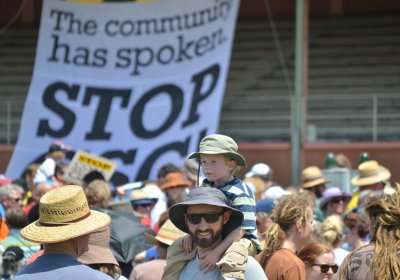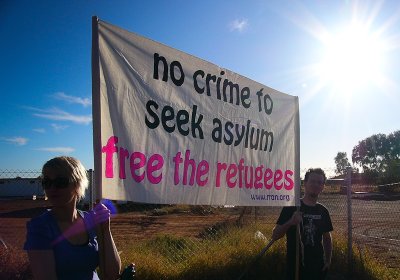It was great to see all big health unions in Victoria hold a joint community rally on February 3 to protest against the state and federal governments’ slashing of health funding in Victoria. But any casual observer couldn’t help feeling that a re-elect Labor strategy was lurking.
It was true that all of the secretaries from the key health unions roundly condemned the state Coalition and federal Labor governments for the $107 million cut to be implemented by June this year. The cut will result in more than 300 beds closing, elective surgery delays and job losses in many hospitals.
Australia
Perth activist Trish McAuliffe had a run-in with Stirling City Council in Perth's northern suburbs over a banner on her property advertising a public meeting about gas fracking.
McAuliffe is a member of grassroots campaign group No Fracking Way and put up a hand-painted banner on her property that said “Fracking = pollution”. The sign also gave details for a public meeting organised by the Clean Water Healthy Land Alliance featuring a speaker from the Lock the Gate Alliance.
Soon after Prime Minister Julia Gillard announced the September 14 federal election, opposition immigration spokesperson Scott Morrison confirmed the Coalition's startling plans to turn back every refugee from Sri Lanka without exception.
This would include a new plan to enlist the Australian and Sri Lankan navies to detain and return to Colombo any refugee trying to flee the country by boat, Morrison told ABC's Lateline on February 4.
Naturally, once Julia Gillard called the federal election for September 14, it was all hands on deck in Labor to spruik the party and its many great achievements to ensure Tony Abbott is denied keys to The Lodge.
A highly publicised report by the United Nations' refugee agency labeled conditions in the Manus Island refugee camp “unlawful”, but stopped short of pushing the government to close it completely.
The report was released by the United Nations High Commissioner for Refugees on February 4 after a visit to the detention centre over January 15-17. It principally called for the release of children from the “closed” detention camp. It said the Australian government's regime of “arbitrary, indefinite detention” with no legal framework was “deeply troubling”.
The arrest on February 6 of an Indigenous elder and another Githabul traditional owner on a coal seam gas (CSG) blockade should act as a siren call to all those concerned about our future.
The Labor federal government and the Greens said on January 23 that an 8.6% fall in emissions from the energy sector proved the new carbon price scheme was working. But evidence from Europe suggests Australia’s emissions trading scheme is likely to hinder, not help, emissions cuts.
A report has found that focusing on the treatment and rehabilitation, rather than imprisonment, of Aboriginal people facing drug and alcohol-related charges would save state and territory governments up to $110,000 a year for every person.
The Refugee Action Coalition has condemned the deal with New Zealand to take 150 refugees processed in Australia each year.
“This deal does nothing to provide security for a greater number of asylum seekers or refugees. Australia can easily resettle 150 a year itself.
National protests have been held around the country to oppose changes to welfare payments for sole parents. The federal Labor government is forcing parents to switch to the Newstart allowance once their youngest child turns eight, leaving parents up to $140 a fortnight worse off.
A new group, the Single Parents Action Group (SPAG), coordinated protests across the country on February 5. Rallies took place in every state and territory.
Ten years ago, the February 14-16, 2003 global protests against the looming US-led invasion of Iraq involved more than 12 million people in 700 cities around the world. A million people marched around Australia — 500,000 of them in a huge protest in Sydney that was so big that most participants could not move (let along march) from Hyde Park.
It was the biggest globally coordinated protest ever — certainly the biggest global anti-war protest.
Last month a South Australian Police (SAPOL) officer asked me to monitor the activities of political activists in Adelaide.
On January 17, a plain-clothed officer approached me in a coffee shop. He explained that he recognised me as an activist, and told me he was with a special area of “security and intelligence” that aimed to create links between the police and the activist community.
He appeared interested in gaining information on the activities of environmental groups, the Boycott, Divestment and Sanctions campaign against Israeli products and Tamil solidarity actions.
- Previous page
- Page 676
- Next page











